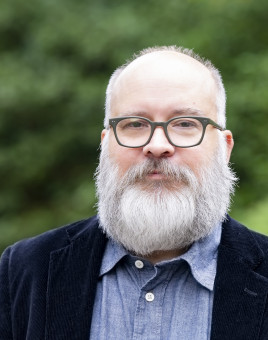
Jay Odenbaugh
James F. Miller Professor of Humanities
On sabbatical for Spring 2024
“Philosophy in its best moments is about instilling intellectual accountability. As William James noted, ‘Many people think they are thinking when they are merely rearranging their prejudices.’”
Personal webpage: http://jay-odenbaugh.squarespace.com/
Specialty
Philosophy of biology, environmental philosophy, philosophy of psychologyAcademic Credentials
PhD University of Calgary, Alberta, Canada, Philosophy
MA Southern Illinois University, Carbondale, Carbondale, Illinois, Philosophy BA Belmont University, Nashville, Tennessee, Philosophy/Biology
Teaching
Jay is on sabbatical for Spring 2024.
Research
Odenbaugh, J. (2023). Philosophy and ethics of de-extinction. Cambridge Prisms: Extinction, 1, e7.
Odenbaugh, J. (2022). Owl vs owl: Examining an environmental moral tragedy. Philosophia, 50(5), 2303-2317.
Odenbaugh, J. (2020). Biodiversity, ecosystem functioning, and the environmentalist agenda. Biology & Philosophy, 35, 1-11.
Odenbaugh, J. (2023). An even better ape? Comments on a better ape. Biology & Philosophy, 38(4), 27.
Odenbaugh, J. (2022). What Should Species Be?: Taxonomic Inflation and the Ethics of Splitting and Lumping. In Species Problems and Beyond (pp. 91-104). CRC Press.
Odenbaugh, J. (2021). Models, models, models: a deflationary view. Synthese, 198(Suppl 21), 1-16
Location: J.R. Howard Hall
Philosophy is located in room 2nd Floor of John R. Howard Hall on the Undergraduate Campus.
MSC: 45
email phil@lclark.edu
voice 503-768-7450
Chair Joel Martizez
Philosophy
Lewis & Clark
615 S. Palatine Hill Road MSC 45
Portland OR 97219